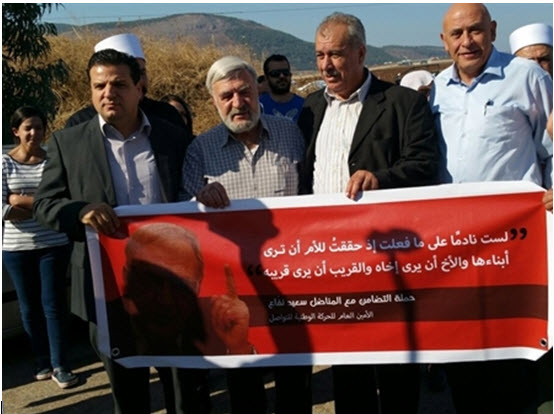Former Balad MK Said Nafaa began a one-year prison term in Gilboa Prison on Sunday, November 1, following his conviction of traveling to Syria, “an enemy state,” after he Israeli Supreme Court rejected a second appeal of his case last month.

Protesters demonstrate for the release of Said Nafaa outside the Gilboa prison on Sunday, November 1, 2015. The banner, displaying a portrait of Said Nafaa and quoting him, reads: “Not regretting what I have done if I have achieved a mother’s being able to see her children, and a brother his brother, and a family member his relative.” First from left: Joint List chairman, MK Ayman Odeh (Hadash); third from left: Chairman of Israel’s Higher Arab Monitoring Committee and former Hadash MK Mohammed Barakeh. (Photo: Al Ittihad)
Adalah – the Legal Center for Arab Minority Rights in Israel – submitted an initial appeal of Nafaa’s conviction which was rejected in August, said Amjad Iraqi, a spokesperson for the organization. Nafaa, an Arab-Druze who served in the Knesset from 2007 until 2013, was charged last year with traveling to an “enemy state” after he made trip to Syria with about 200 other persons in 2007 to visit fellow Druze. He was consequently stripped of his parliamentary immunity in 2010.
Adalah said the original ruling in late August of this year was a blatant example of politics trumping the rule of law. “The court entirely ignored the fact that the charges against Nafaa were for an activity which, as a Member of Knesset who is granted parliamentary immunity, at the time of his trip to Syria he was entitled to leave and enter the Israel freely [without restrictions],” the group stated in a news release. “Since its establishment, Israel has had a long-standing policy of segregating various Palestinians populations from one another,” Iraqi said. He added that, in the territories it directly or indirectly controls, “Israel has attempted to achieve this same segregation through a tiered legal-political hierarchy of Palestinians, Israeli citizens, East Jerusalem residents, [and] West Bank residents. The policy has been successful in some practical respects, including separating Gaza from the West Bank, and banning Palestinian citizens from visiting most Arab countries.”
MK Youssef Jabareen (Joint List – Hadash) said Israel traditionally uses a divide-and-conquer policy to deny Palestinians an identity as a national group. “It treats Israel’s Christian and Druze minorities as ethnic minority communities at the expense of their Arab identity. Elsewhere in the Arab world, Druze are treated as Arabs with Druze being their religion,” Jabareen said, noting that in an effort to further this division, Israel developed a separate education system for the Druze in 1976, and applied similar policies to Christian Palestinians. “Even in Israel’s official Hebrew terminology there is little reference to Arab nationality or identity, while the term Palestinian is hardly ever heard [in official public discourse]. Palestinians in Israel are referred to as Israeli Arabs, non-Jews or other minority names,” Jabareen said.
In response to the Supreme Court’s second rejection of Nafaa’s appeal and the start of his one-year prison term, the new chairman of Israel’s Higher Arab Monitoring Committee and former MK Mohammed Barakeh (Hadash) condemned the decision saying, “Nafaa is paying the price and going to jail for all of us.”


